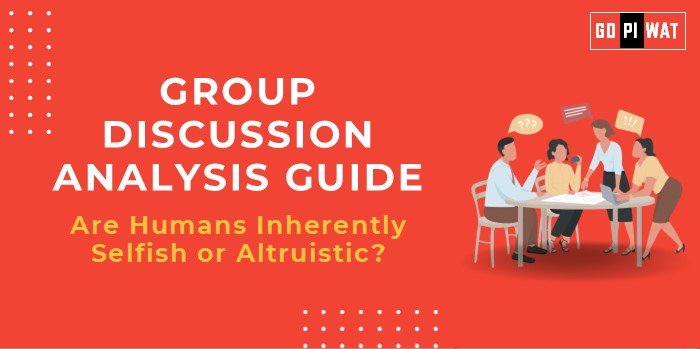📋 Group Discussion Analysis Guide: Are Humans Inherently Selfish or Altruistic?
🌐 Introduction to the Topic
Context Setting: “From acts of self-sacrifice in disasters to daily acts of generosity, human behavior oscillates between self-interest and altruism, sparking an age-old debate in philosophy and psychology.”
Background: This topic examines core ethical and philosophical questions: Are our actions driven by self-preservation, or do we possess an innate capacity for selflessness? It draws insights from evolutionary biology, societal norms, and psychological studies.
📊 Quick Facts and Key Statistics
- 🦧 Evolutionary Perspective: Altruistic acts have been observed in 60% of primate species, supporting the evolutionary argument for cooperative behavior.
- ⚖️ Economic Models: Studies show 70% of participants in experiments like the Ultimatum Game display fairness, even at a personal cost.
- 💰 Charitable Contributions: Global charitable donations exceeded $500 billion in 2022, illustrating widespread altruistic tendencies.
- 🧠 Psychological Studies: 80% of people report experiencing empathy when witnessing distress in others, according to a 2023 survey.
- 🔗 Conflict Behavior: Selfish actions dominate in 60% of prisoner’s dilemma experiments, emphasizing contextual selfishness.
🤝 Stakeholders and Their Roles
- 📚 Philosophers: Analyze ethical theories, from Hobbesian selfishness to Kantian moral imperatives.
- 🧠 Psychologists: Study behavior patterns, including empathy and self-interest, in controlled environments.
- 🌏 Societies and Cultures: Influence behaviors through norms, religions, and community structures.
- 🧬 Biologists: Explore genetic predispositions for altruism through evolutionary frameworks.
🏆 Achievements and Challenges
✨ Achievements:
- 🚑 Crisis Response: High altruistic participation during events like COVID-19 and natural disasters.
- 🤝 Philanthropy: Billionaires contributing over $100 billion globally in 2022.
- ⚖️ Empathy in Governance: Policies promoting public welfare, e.g., universal healthcare in Europe.
- 🔬 Scientific Evidence: Studies on mirror neurons underline the biological basis for empathy.
⚠️ Challenges:
- 💸 Economic Inequality: Unequal resource distribution often curtails altruistic behavior.
- 🌍 Cultural Variances: Societies with high individualism (e.g., the U.S.) may exhibit less collective altruism compared to collectivist cultures (e.g., Japan).
- 💤 Psychological Barriers: “Compassion fatigue” reduces consistent altruistic actions.
- 📉 Global Comparison: Nordic countries excel in altruistic governance, unlike many developing nations.
💬 Structured Arguments for Discussion
- ✅ Supporting Stance: “Altruistic actions have evolutionary roots, as seen in mutual aid during crises.”
- ❌ Opposing Stance: “Even altruistic acts are selfish at their core, driven by emotional rewards or societal approval.”
- ⚖️ Balanced Perspective: “While humans demonstrate altruistic tendencies, these often coexist with self-interest, shaped by context.”
📖 Effective Discussion Approaches
- 💡 Opening Approaches:
- 📊 “80% of people report empathy-driven behavior in distress scenarios, but selfishness dominates in economic games.”
- 📜 “Hobbes argued that life in its natural state is ‘nasty, brutish, and short,’ yet history contradicts this with acts of immense sacrifice.”
- 🌊 Highlighting altruism during the 2004 Indian Ocean Tsunami.
- 📌 Counter-Argument Handling:
– “While altruism may appear purely selfless, studies in psychology reveal inherent emotional rewards, blending selfishness and altruism.”
🔍 Strategic Analysis of Strengths and Weaknesses
SWOT Analysis:
- Strengths: Evolutionary support for cooperation, cultural promotion of empathy, policy success in welfare states.
- Weaknesses: Context-dependent altruism, societal bias towards individualism.
- Opportunities: Promoting empathy education, global initiatives like SDGs.
- Threats: Rising inequality, erosion of communal values.
🏫 Connecting with B-School Applications
Real-World Applications:
– Leadership roles demand balancing self-interest and collective welfare.
📄 Sample Interview Questions:
- 💬 “How would you balance individual incentives with team goals?”
- 💡 “Discuss examples of altruism in organizational leadership.”
Insights for Students:
– Learn negotiation strategies blending fairness and self-interest.
– Study behavioral economics to understand the altruism-selfishness dichotomy.


